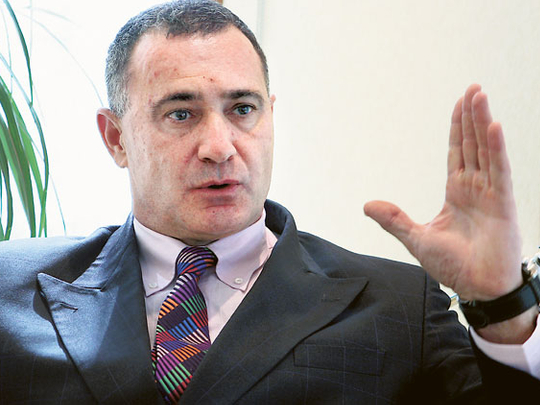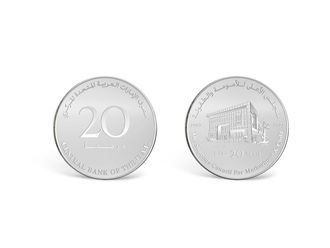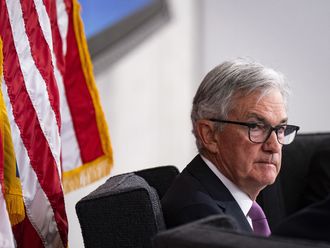
Sharjah: Incorporated in 1975 with its headquarters in Sharjah, United Arab Bank (UAB) is known for its strong financial fundamentals, solid profitability, good asset quality and capitalisation levels.
The bank maintained its strong performance when many counterparts were impacted on asset quality and profitability due to the challenging economic environment.
The bank recently reported Dh330 million net profit for 2011, up 7.1 per cent over 2010. Against the overall lacklustre loans and deposit growth of 3.8 per cent and 1.9 per cent respectively in the UAE last year, UAB reported a 46 per cent increase in loans and advances and 72 per cent growth in customer deposits.
Speaking to Gulf News, Paul Trowbridge, chief executive officer, explained the bank's strategy to position itself as a niche player in corporate, retail and Islamic banking business, where several other institutions are already dominant.
UAB has been reporting consistent performance with reasonable growth in profits through these difficult years. What do you attribute this to?
We were always led by the fundamentals of business. It could have been possible for us to join the rest of the banks to take exposure to the property sector during the boom years.
A few years ago, we hardly had any retail business or retail products to really speak of. But, the bank recognised that it needed to diversify its risk profile and geographic presence. At the same time, the directors also recognised the need to reconnect with our roots.
Our name is the United Arab Bank. It wasn't really looking very Arab. The bank was largely focused in one emirate with limited presence in the rest of the country with a single branch in the largest emirate. While the bank recognised the need to diversify its business, it took a conscious decision to be careful with high risk businesses like property-related lending.
The bank saw significant balance sheet growth last year both on the assets and liabilities side, with loans and advances and deposits growing at several times the national average. How do you explain this growth in a rather difficult business environment?
De-risking the balance sheet always does not mean that you become more conservative. During the last few years, our focus has been on protecting the good quality assets we have and add more of that to our books. We did two things. First of all, we simply opened more new branches.
The second thing is that we started Islamic banking with the objective of giving our customers more choice. We are not a retail bank as such, but we started offering retail products and services. We can't be all things to all people. Obviously, we don't want to compete with the larger banks in the market. But what we are attempting to do is to deliver (retail banking) services to a clearly identified target market with a very high level of service.
Is your Islamic banking business contributing substantially to the liability side of the business in terms of securing cheap funding?
Our Islamic deposits are not substantial. We would like to be bigger, but the Islamic banking offering is aimed at giving our customers a choice between conventional and Islamic offerings. Going forward, we hope to have more banking relations in the Islamic side of our business.
Last week we saw the launch of Al Ahlam which has a specific focus on the UAE national customers. Are you increasingly focusing on a stronger national customer base?
We certainly want a good share of business from the national population. But the truth is that we do not have specifically designed products for any specific customer segments. What we are attempting to do is to give a better level of banking experience to all our customers while offering the best we can to all, keeping in mind the requirements of our customers.
Being a small bank, do the benefits justify the cost of campaigns like the Al Ahlam?
All things we do now have a 20-year view in mind with the full support of the bank's board. It is not about recording spectacular results in one or two years, but is about building a sustainable business with good repeat earnings year after year.
This requires investments into systems, people and marketing to build relationships with communities and customer segments. We would have had better profits in 2011 without these expenses, but these initiatives we took last year is going to have a long lasting impact on the bank's earnings over the next few years.
There are signs of decline of non performing loans across the banking sector; however, there is uncertainty related to corporate restructurings. Are restructurings a cause of concern for UAB?
As I always say, I can't speak for all banks. But, I can say that because of the conscious decision of our directors not to enter the property market and in fact having not much property at all, we have not been forced into restructuring.
Any bank in the world at any time will always have customers who have issues. Things could go wrong with the best of customers. We are always prepared to sit with these customers and work out reasonable solutions.
Last October, when Moody's assigned ratings, they commented that the rating is constrained by the small market share, limited geographic diversification, and lending and funding. Is there any move towards addressing these issues?
Frankly, I will be worried about a bank that attempts to fix everything in a 12-month time period. We do take a multi-year view. We have doubled the size of our footprint which means now we have the ability to reach out to many more people of different nationalities while proactively de-risking our balance sheet. I hope when the credit rating agencies take a look at us again, they will definitely consider the progress we have made.
The bank has clearly achieved significant deposit growth, but with the kind of loan book expansion, are you looking at diversifying funding sources?
We are fortunate that we have got a large number of customers, corporate customers and private individuals who have their current account and deposit money with us. That has been good enough so far.
I think what the financial crisis has taught us is that we must diversify the funding sources. So, we could do something to diversify our sources but we would not be raising funds through equity expansion. We might go to the market with a pure debt product at some point in the future.












